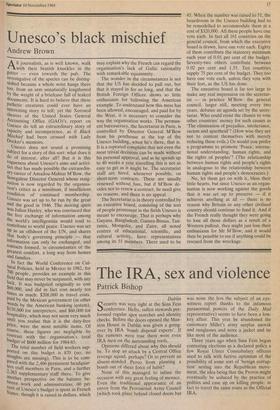Unesco's black mischief
Andrew Brown
A 11 journalists, as is well known, walk -h-with their brutish knuckles in the gutter — even towards the pub. The investigative of the species can be disting- uished because a whole wrist hangs there too, from an arm unnaturally lengthened by the weight of a briefcase full of leaked documents. It is hard to believe that these Pathetic creatures could ever have an interesting story to tell; yet the Xeroxed Sheaves of the United States General Accounting Office (GA0)'s report on Unesco do tell an extraordinary story of rapacity and incompetence, as if Black Mischief had been crossed with Lady Docker's memoirs.
Unesco does not sound a promising subject for a story of this sort: what does it do of interest, after all? But it is this vagueness about Unesco's aims and activi- ties that has made possible the extraordin- ary career of Amadou-Mahtar M'Bow, the Senegalese Director General whose resig- nation is now regarded by the organisa- tion's critics as a minimum, if insufficient condition of continued membership. Unesco was set up to be run by the great and the good in 1946. The moving spirit was Julian Huxley, who was convinced that the free exchange of information among the world's intelligentsia would tend to contribute to world peace. Unesco was set uP as an offshoot of the UN, and shares that body's governing principle — that information can only be exchanged, and contacts formed, in circumstances of the greatest comfort, a long way from homes and families.
In fact the World Conference on Cul- tural Policies, held in Mexico in 1982, for 700 people, provides an example in this field that may never be surpassed, with any hick. It was budgeted originally to cost $60,000, and did in fact cost nearly ten times as much: $208,000 in travel costs, Paid by the Mexican government (in other Words by the American banking system), $150,000 for interpreters, and $60,000 for hospitality, which may not seem very much until you realise that it is the duty-free price, were the most notable items. Of course, these figures are negligible by contrast with the organisation's total budget of $600 million for 1984-85. The total number of field workers sup- Ported on this budget is 870 (no, no noughts are missing). This is to be com- pared with the 2,466 permanent headquar- ters staff members in Paris, and a further 2,363 supplementary staff there. To give another perspective on the balance be- tween work and administration', 60 per etit of Unesco's budget is spent in French [rocs, though it is raised in dollars, which
may explain why the French can regard the organisation's lack of Gallic rationality with remarkable equanimity.
The wonder in the circumstances is not that the US has decided to pull out, but that it stayed in for so long, and that the British Foreign Officee shows so little enthusiasm for following the American example. To understand how this mess has been allowed, encouraged, and paid for by the West, it is necessary to consider the way the organisation works. The perman- ent bureaucracy, the Secretariat in Paris, is controlled by Director General M'Bow from his penthouse at the top of the Unesco building, when he's there, that is. It is a repeated complaint that not even the most trivial decisions can be made without his personal approval, and as he spends up to 40 weeks a year travelling this is not as easy to get as it might be. The secretariat staff are hired, whenever possible, on short-term contracts. These are usually renewed without fuss, but if M'Bow de- cides not to renew a contract, he need give no reasons, and there is no appeal.
The Secretariat is in theory controlled by an executive board, consisting of the sort of people prominent in the fields Unesco is meant to encourage. That is perhaps why Guyana, Bangladesh, Guinea-Bissau, Tan- zania, Mongolia, and Zaire, all noted centres of educational, scientific, and cultural activity, have representatives among its 51 members. There used to be 45. When the number was raised to 51, the boardroom in the Unesco building had to be remodelled to accommodate them at a cost of $320,000. All these people have one vote each. In fact all 161 countries on the general council, from which the executive board is drawn, have one vote each. Eighty of them contribute the statutory minimum each year of 0.01 per cent of the budget. Seventy-two others contribute between 0.02 per cent and 1.55. Ten countries supply 75 per cent of the budget. They too have one vote each, unless they vote with their feet, as the US has done.
The executive board is far too large to make any, real impression on the secretar- iat — in practice M'Bow: the general council, larger still, meeting every two years, debates an agenda set by the secre- tariat. Who could resist the chance to vote other countries' money for such causes as 'The elimination of prejudice, intolerance, racism and apartheid'? (How wise they are not to content themselves with merely reducing these evils.) Or would you prefer a programme to promote 'Peace, interna- tional understanding, human rights, and the rights of peoples'? (The relationship between human rights and people's rights in analogous to the relationship between human rights and people's democracies.) No, let them get on with it, bless their little hearts, but since Unesco as an organ- isation is now working against the goods that it was set up to preserve — if it achieves anything at all — there is no reason Why Britain or any other civilised country should continue to fund it. And if the French really thought they were going to lose all those dollars as a result of a Western pullout, they might just lose their enthusiasm for Mr M'Bow; and it would then be possible to see if anything could be rescued from the wreckage.














































 Previous page
Previous page